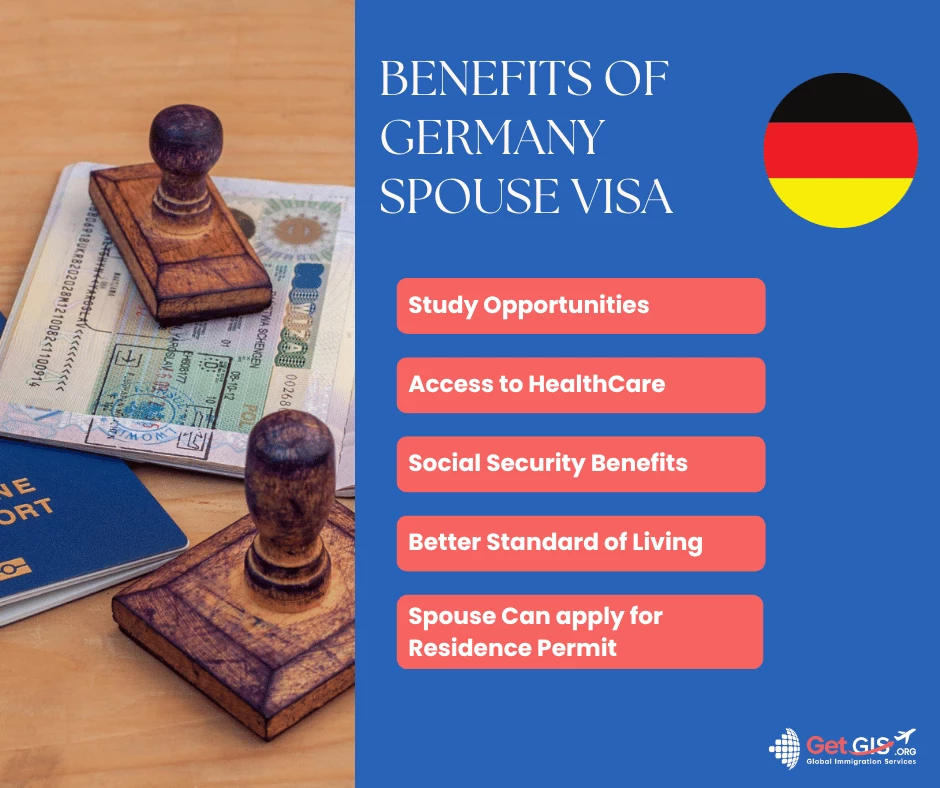GERMANY DEPENDANT VISA
Greetings from the top immigration and visa advisor in the Italy for Indian nationals. Obtain a free online assessment to relocate from India to the Italy. Allow us to assist you!
Visa for Family Reunion in Germany
The German government allows immigrants from non-EU countries who are working in the country to bring their family members to the country on a temporary or permanent basis.
The German government supports the re-unification of families and allows immigrant workers to bring their family members on a temporary or permanent basis. They have a special visa for this known as the German Family Reunion Visa.
Criteria for Qualifying for the Visa:
The criteria for qualifying for a German Family Reunion Visa can be broken down into three main categories:
Relationship:
- Close Relative: You must be a close relative of a German resident with a valid permit. This can include:
- Spouse or civil partner
- Child (minor and in some cases adult)
- In some cases, parents and parents-in-laws (as of March 2024)
- Proof of Relationship: You’ll need documents like a marriage certificate, birth certificate, or adoption papers to prove your relation to the German resident.
- Financial Support:
- German Resident’s Finances: The German resident you’re joining must be able to financially support you. This means they need to show they have sufficient income to cover your living expenses.
Proof of Income: The German resident may need to provide employment documents, bank statements, or other proof of their financial standing.
- Language Skills: While not always mandatory, you may need to demonstrate basic German language proficiency (usually level A1) depending on your situation.
- Accommodation: Proof of suitable accommodation in Germany for you might be required. This could be a rental agreement or a letter from the resident confirming they have enough space to house you.
Essential Documents
Proof of accommodation – demonstrating that the German citizen has enough room in their home for the applicant.
Proof of the applicant’s German language skills at least at level A1.
Eligibility Criteria for Sponsoring a Spouse or Registered Partner
Sponsoring a spouse/partner abroad varies by country. Here’s the gist:
- Married/Registered Partnership: Most require legal marriage or a recognized registered partnership.
- Age: You and your partner may need to be above 18.
- Genuine Relationship: Proof like cohabitation history or documented evidence is often required.
- Finances: You might need to show enough income to support your partner.
Check your country’s immigration department website or embassy/consulate abroad for specifics.

Criteria for Sponsoring Children
When sponsoring a child, consider two main scenarios:
1. Sponsorship Organizations:
- Child’s Needs: Age (often under 18), location, specific challenges (poverty, education).
- Sponsor’s Eligibility: Age (18+), financial stability, legal background check (by program).
- Program Requirements: Vary by organization (application process, communication).
2. Directly Sponsoring a Known Child (Less Common):
- Needs Assessment: Identify specific needs (education, healthcare, basic necessities).
- Financial Capability: Ensure you can provide consistent support.
- Legal/Familial Considerations: Involve legal guardians, navigate family dynamics.
In both cases, choose a program/approach that aligns with your values and ensures transparency.
Bringing Children to Germany as Dependents
Bringing your children to Germany as dependents is possible if you already have a valid residence permit in the country. Here’s a breakdown of the process:
Eligibility:
- Your Status: You must hold a temporary or permanent residence permit in Germany.
- Child’s Age: Generally, children under 18 years old qualify as dependents.
- EU/EEA Citizenship: If your children are citizens of a European Union (EU) or European Economic Area (EEA) country, they likely don’t need a visa for Germany and can enjoy freedom of movement within the zone.
Visa Requirements (For Non-EU/EEA Children):
- Family Reunion Visa: Children of residents typically apply for a family reunion visa (“Familiennachzug”).
- Documents: Prepare documents like birth certificates, proof of your relationship, and evidence of your financial resources to support your children.
- German Language: Basic German language proficiency might be required, with exceptions (already joining a minor child, spouse with special permit etc.).
Additional Considerations:
- Age Exceptions: In some cases, adult children (over 18) facing “unavoidable hardship” if not allowed to join you might qualify for a visa.
- Processing Time: Visa applications typically take 1-3 months, but can vary depending on document verification.
Resources:
- German Federal Foreign Office: Search online for “German embassy in [your country] family reunion” for specific requirements and application procedures in your country.
- Make it in Germany: German Family Reunion Visa Requirements (general overview)
Remember: It’s always best to consult the official German embassy or consulate in your home country for the most up-to-date information and specific requirements applicable to your situation.
Minor Children
When it comes to bringing minor children (under 18) to Germany as dependents, the process is generally easier than for adult children. Here’s a more focused look:
Eligibility:
- Your Status: You must hold a valid German residence permit (temporary or permanent).
- Child’s Age: Your children must be under 18 years old.
- Relationship: You need to be their biological parent, adoptive parent, or legal guardian.
Visa Type:
- Family Reunion Visa: Minor children typically apply for a “Familiennachzug” visa specifically designed for family reunification.
Required Documents (may vary):
- Valid passport for your child
- Completed application forms (often online)
- Birth certificate proving your relationship to the child
- Proof of your German residence permit
- Evidence of your financial resources to support your child in Germany (employment documents, bank statements etc.)
- Proof of suitable accommodation in Germany for your entire family
- Travel health insurance valid in Germany for your child
- Biometric passport photos for your child
German Language Skills:
- Basic German language proficiency might be required for your child, but there are exceptions:
- You are already joining a minor child already in Germany.
- Your child has a health condition preventing them from learning German.
Processing Timeline:
- Generally 1-3 months, but can be longer depending on document verification.
Additional Considerations:
- Pre-existing Medical Conditions: If your child has a pre-existing medical condition, you may need to show proof of health insurance that covers their specific needs in Germany.
Resources:
- The German Federal Foreign Office website for your country. Search online for “German embassy in [your country] family reunion” for the most up-to-date information on procedures and requirements specific to your situation.
Remember, consulting the German embassy or consulate in your home country is crucial to ensure you have the latest details and navigate the process smoothly.
Adult offspring
Bringing adult offspring (children over 18 years old) to Germany as dependents is a bit more complex than bringing minor children. Here’s what you need to know:
General Eligibility: You must hold a valid German residence permit (temporary or permanent).
- Offspring’s Age: Your child must be over 18 years old.
- Challenges for Adult Offspring:
- Not Automatic: Unlike minor children, adult children don’t automatically qualify for family reunion visas.
- “Unavoidable Hardship”: They need to demonstrate “unavoidable hardship” if they are not allowed to join you in Germany.
Examples of “Unavoidable Hardship”:
- Financial Dependence: Your child may need to show they are financially dependent on you and cannot support themselves independently.
- Health Issues: If your child has a serious health condition requiring your care, that could qualify as hardship.
- History of Living Together: A history of living together as a close family unit before your move to Germany might strengthen your case.
Visa Type:
- Family Reunion Visa: While not guaranteed, adult children can still apply for a “Familiennachzug” visa, but with the need to demonstrate hardship.
Documents (Similar to Minor Children, but with focus on hardship):
- Valid passport for your child
- Completed application forms
- Birth certificate proving your relationship
- Proof of your German residence permit
- Evidence of your financial resources
- Documents proving “unavoidable hardship” your child faces if not allowed to join you (financial statements, medical records, proof of cohabitation etc.)
- Proof of suitable accommodation in Germany for your entire family
- Travel health insurance valid in Germany for your child
- Biometric passport photos for your child
German Language Skills:
- Similar to minor children, basic German language proficiency might be required for your adult child, with exceptions for health reasons or if they are joining a minor child already in Germany.
Processing Timeline:
- Expect a longer processing time than for minor children, potentially exceeding 3 months due to the need to assess the hardship claim.
Additional Considerations:
- Pre-existing Medical Conditions: If your child has a pre-existing medical condition, you may need to show proof of health insurance that covers their specific needs in Germany.
Resources:
- The German Federal Foreign Office website for your country. Search online for “German embassy in [your country] family reunion” for the most up-to-date information on procedures and requirements specific to your situation.
Important Note: Consulting the German embassy or consulate in your home country is crucial for adult offspring situations. They can guide you through the specific requirements for demonstrating “unavoidable hardship” and increase your chances of a successful application.
Employment under a Family Visa
Generally, holding a family visa in Germany doesn’t automatically grant you permission to work. However, there are circumstances where you can be eligible for employment. Here’s a breakdown:
- Limited Employment Rights:
A family visa itself doesn’t guarantee unrestricted work rights. You’ll likely need a separate work permit to be officially employed.
Exceptions and Possibilities:
- Spouse/Partner of a Skilled Worker: If your spouse or registered partner has a special permit for skilled workers (“Niederlassungserlaubnis”), you might be exempt from the German language requirement for employment.
- Applying for a Work Permit: While not automatic, you can still apply for a work permit alongside your family visa application, or even after receiving the family visa.
Types of Work Permits for Family Visa Holders:
- Dependent’s Employment Permit (“Beschäftigungserlaubnis für Familienangehörige”): This permit allows you to work in most professions, with some exceptions (usually civil service jobs). You’ll likely need to demonstrate sufficient German language skills and that your employment won’t negatively impact the German labor market.
- Freelance Work: In some cases, you might be able to freelance or work as a self-employed contractor under a family visa, but regulations can be complex. Consulting a lawyer specializing in immigration is recommended.
Visa Processing Duration
The processing duration for a German Family Reunion Visa can vary depending on several factors, but here’s a general guideline:
- Typical Range: Expect the process to take anywhere from 1 to 3 months.
- Possible Delays: It can take longer in some cases, especially if there are complexities with document verification or demonstrating “unavoidable hardship” (for adult children).
Here are some reasons why processing times might fluctuate:
- Workload: The workload of the German embassy or consulate you’re applying through can impact processing speed.
- Completeness of Application: Ensure your application is complete and includes all necessary documentation to avoid delays.
- Complexity of Case: Adult children needing to prove “unavoidable hardship” will likely face longer processing times for additional evaluation.
Tips to Minimize Processing Time:
- Gather Documents Early: Start collecting all required documents well in advance.
- Double-Check Applications: Carefully review your application forms for accuracy and completeness before submission.
- Meet with Officials (if possible): If available, consider scheduling a consultation with embassy or consulate officials to address any potential issues before submitting your application.
Here are some resources to track processing times:
- The German Federal Foreign Office website for your country: Search online for “German embassy in [your country] family reunion”. They might have information on current processing timelines specific to their location.
- Contacting the Embassy or Consulate Directly: Reach out to the German embassy or consulate you’re applying through for the most recent estimates on processing times in their jurisdiction.
Remember, these are just estimates. The actual processing time for your visa can vary. It’s always best to stay in touch with the relevant German authorities for the latest updates on your application.
Book a 1-on-1 chat with our Experts on VISA Process!
- Visit Visa
USA Visit Visa
UK Visit Visa
Germany Visit Visa
Canada Visit Visa
Australia
Switzerland Visit Visa
Dubai Visit Visa
Italy Visit Visa
- Student Visa
USA Student Visa
UK Student Visa
Germany Student Visa
Canada Student Visa
Europe Student Visa
Australia Student Visa
Dubai Student Visa
Italy Student Visa
- Work Visa
H1B Visa
UK Work Visa
Germany Work Visa
Canada Work Visa
Switzerland Work Visa
Australia Work Visa
Dubai Work Visa
Italy Work Visa
Why Choose Us for Your Visa Application?
Trust FND Overseas Education for Your Visa Needs
Thousands Of People Choose Our Services
What our customers say
WHAT OUR CLIENTS SAY?
Our Satisfied Clients
I received timely advice, prompt replies and correct document guidance that ensured the success of my Canada visit visa application. I would surely recommend Fnd Overseas

Need help with Immigration? Come to Fnd Overseas Education
Ask us your questions
If you have any questions, please fill out our form to request a call from an expert.
Talk to Immigration Experts
Do you require more personalized guidance? Our Immigration professionals to assist you.



